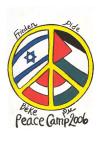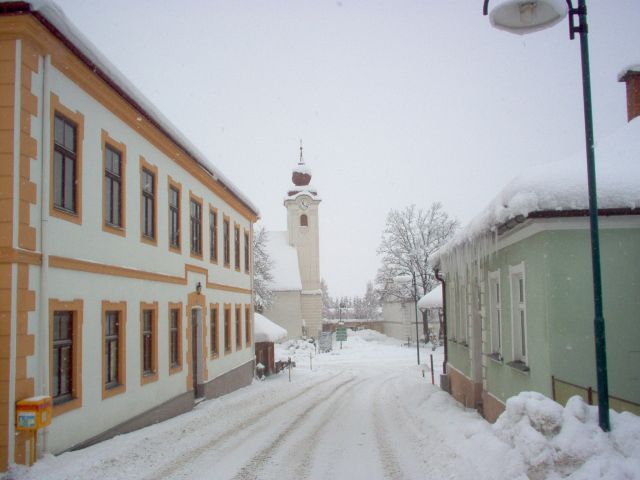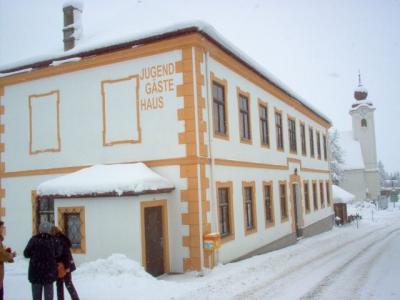... newer stories
Thursday, 27. July 2006
peacecamp, 01:34h
Dear Israeli and Palestinian peacecamp-participants,
can some of you very quickly write an article about the war with Lebanon - how and why it started, and your own perception of it?
Please send it quickly to
bohmerATutanet.at
It may be published in a newspaper here in Austria.
thank you
evelyn
can some of you very quickly write an article about the war with Lebanon - how and why it started, and your own perception of it?
Please send it quickly to
bohmerATutanet.at
It may be published in a newspaper here in Austria.
thank you
evelyn
... link (0 Kommentare) ... comment
peacecamp, 01:28h
Dear participants of peacecamp 2006,
this is YOUR SPACE on this site for you to use as you please.
just log yourself in: in order to do this, you must
1. click on "LOGIN" here on the right hand side.
2. put your USERNAME in the first line
3. put your password in the second line
4. save your LOGIN-data on your pc (if you want)
Now you can put in anything you want, texts and pictures, letters to the other visitors of the site - just anything you want.
In order to write, you must click "Write a Text" here on the left hand side.
When you are finished with writing, and
before you click on "publish" select "peacecamp NOW".
Have fun NOW
on
peacecamp NOW
See you very soon
Evelyn
this is YOUR SPACE on this site for you to use as you please.
just log yourself in: in order to do this, you must
1. click on "LOGIN" here on the right hand side.
2. put your USERNAME in the first line
3. put your password in the second line
4. save your LOGIN-data on your pc (if you want)
Now you can put in anything you want, texts and pictures, letters to the other visitors of the site - just anything you want.
In order to write, you must click "Write a Text" here on the left hand side.
When you are finished with writing, and
before you click on "publish" select "peacecamp NOW".
Have fun NOW
on
peacecamp NOW
See you very soon
Evelyn
... link (0 Kommentare) ... comment
hey
nosa, 01:21h
hey everyone! i know its too early to say this but i'm starting to miss all of you.. i wanted to tell you that beeing with you was the best experiance in my life. you taught me lots of stuff and i would like to thank you for that and hope we will meet again verry soon and that we will keep in touch
p.s. for those who doesnt know my e-mail addresses are: 1.eyes_of_angel@hotmail.co.il
2.lonly_without_ur_toch@Hotmail.com
all the love in th world
enas
p.s. for those who doesnt know my e-mail addresses are: 1.eyes_of_angel@hotmail.co.il
2.lonly_without_ur_toch@Hotmail.com
all the love in th world
enas
... link (0 Kommentare) ... comment
I've learnt-and I'm learning how to use this site
denish, 23:46h
Hmm...It would be easier if the registration could be in English :)
So... I leart how NOT to hate our enemy from the participants of Israel and Palestina, and learnt how to say "I love YOU" from all the participants...
So... I leart how NOT to hate our enemy from the participants of Israel and Palestina, and learnt how to say "I love YOU" from all the participants...
... link (2 Kommentare) ... comment
PEACECAMP 2006
the day we lay down our weapons to fire our voices ...
by Rafael Milan Kropiunigg [rafael.kropiuniggATgmail.com]
the day we lay down our weapons to fire our voices ...
by Rafael Milan Kropiunigg [rafael.kropiuniggATgmail.com]
peacecamp, 22:00h
PEACECAMP 2006
the day we lay down our weapons to fire our voices ...
Which prelude to peace would you choose? Troops marching into Lebanon with AK-47’s in front of their faces, or groups from ‘Peacecamp’ skipping into Vienna aeroport with nothing but peace in mind and mouths full of strong debate? Both troops and groups claim to have the same mission, the mission for peace. Now isn’t that ironic?
Before coming to Franzen I thought that politics would cause thunder and lighting to dance across the debating floor. As the days passed by, it dawned on me why politics was always secondary during group sessions, and furthermore, why political discussions never ended in bloody fist-fights, screeching, or scratching. Only after a while I realised that the purpose of four nationalities coming together in a village in the heart of Austria’s rural community, was not only to find out what could be done with Hezbollah, Israel, Syria, Iran, and so on, but rather to learn to simply co-exist together. The israeli’s, palistinian’s, austrians, and hungarian’s seemed to have packed no prejudice nor anger into their suitcases.
The particpiants from Israel represent a minority. They are a progressive segment of people within their society. On a freqeunt basis they have to deal with racism, prejudice, and violence. Debate seems like an abstract tool that gets them nowhere. However, these participants have learned that there is still hope, that there are still people who believe in peaceful negotiations. Some of them suggest they did not even know that there were people ‘from the other side’ sharing their peaceful thoughts.
Even though we sometimes kicked off group dynamic discussions by conversing about the role of pets in society, and such, we found that when the time was right we were also able to talk out human issues. These issues usually received 110 per cent patricipation level - this included topics such as women’s rights, social policy, globalization and a couple others. We all knew that any talks would not provide immediate answers, but rather that peaceful debate is a long-term method to solving complicated issues.
It is about “spreading the word,” one of our counselor’s said. This is true. A lot of people suggested that they had prejudice feelings towards ‘the other side’ before they joined Peacecamp, but left feeling no sense of hate or regret. We must spread this feeling across the world. I hope this is an inspiration to you all, and i hope that it will inspire you to give peace-orientated activities a shot. In reading this, I want you to realise that being biased will never bring solutions. If both sides victimize one another, or see themselves as victims, then there will be no solutions. It is rather paradox that in a camp full of adolescents I learned that we musn’t see life so black and white. We must learn to compromise with shades of grey in order to get something. Peace is never white. Although Peacecamp sounds very corny and ideological, I believe that the participants remained very realistic.
I believe that we must remain on, more or less, neutral ground to pave the road for mutual co-existance in this world. No matter what the situation. “To be neither actor nor victim,” is the camp slogan, but I believe that it is almost impossible to be neutral when you are personally affected. However, we can always try to see thing both both points of views through consuming a wide range of media and being open to different perspectives.
I have learned that peace starts with the youth. We must break the generation contract in which belief is passed down by our parents from generation to generation. Rather, we must be given the chance to make up our own minds through mingeling and debating with people our own age. We must come together in camps such as these and brainstorm. This is what I call the road to peace, and I think we are already on it.
“SPREAD THE WORD!”
- rafi k.
the day we lay down our weapons to fire our voices ...
Which prelude to peace would you choose? Troops marching into Lebanon with AK-47’s in front of their faces, or groups from ‘Peacecamp’ skipping into Vienna aeroport with nothing but peace in mind and mouths full of strong debate? Both troops and groups claim to have the same mission, the mission for peace. Now isn’t that ironic?
Before coming to Franzen I thought that politics would cause thunder and lighting to dance across the debating floor. As the days passed by, it dawned on me why politics was always secondary during group sessions, and furthermore, why political discussions never ended in bloody fist-fights, screeching, or scratching. Only after a while I realised that the purpose of four nationalities coming together in a village in the heart of Austria’s rural community, was not only to find out what could be done with Hezbollah, Israel, Syria, Iran, and so on, but rather to learn to simply co-exist together. The israeli’s, palistinian’s, austrians, and hungarian’s seemed to have packed no prejudice nor anger into their suitcases.
The particpiants from Israel represent a minority. They are a progressive segment of people within their society. On a freqeunt basis they have to deal with racism, prejudice, and violence. Debate seems like an abstract tool that gets them nowhere. However, these participants have learned that there is still hope, that there are still people who believe in peaceful negotiations. Some of them suggest they did not even know that there were people ‘from the other side’ sharing their peaceful thoughts.
Even though we sometimes kicked off group dynamic discussions by conversing about the role of pets in society, and such, we found that when the time was right we were also able to talk out human issues. These issues usually received 110 per cent patricipation level - this included topics such as women’s rights, social policy, globalization and a couple others. We all knew that any talks would not provide immediate answers, but rather that peaceful debate is a long-term method to solving complicated issues.
It is about “spreading the word,” one of our counselor’s said. This is true. A lot of people suggested that they had prejudice feelings towards ‘the other side’ before they joined Peacecamp, but left feeling no sense of hate or regret. We must spread this feeling across the world. I hope this is an inspiration to you all, and i hope that it will inspire you to give peace-orientated activities a shot. In reading this, I want you to realise that being biased will never bring solutions. If both sides victimize one another, or see themselves as victims, then there will be no solutions. It is rather paradox that in a camp full of adolescents I learned that we musn’t see life so black and white. We must learn to compromise with shades of grey in order to get something. Peace is never white. Although Peacecamp sounds very corny and ideological, I believe that the participants remained very realistic.
I believe that we must remain on, more or less, neutral ground to pave the road for mutual co-existance in this world. No matter what the situation. “To be neither actor nor victim,” is the camp slogan, but I believe that it is almost impossible to be neutral when you are personally affected. However, we can always try to see thing both both points of views through consuming a wide range of media and being open to different perspectives.
I have learned that peace starts with the youth. We must break the generation contract in which belief is passed down by our parents from generation to generation. Rather, we must be given the chance to make up our own minds through mingeling and debating with people our own age. We must come together in camps such as these and brainstorm. This is what I call the road to peace, and I think we are already on it.
“SPREAD THE WORD!”
- rafi k.
... link (0 Kommentare) ... comment
Thursday, 2. March 2006
To be neither victims nor actors: Youth from Israel, the Palestinian Territories, Hungary and Austria explore ways and obstacles to coexistence and mutual understanding
A Hadassah Austria Project sponsored by the European Union, the Federal Ministry for Education, Science and Culture and the Karl Kahane Foundation
Idea and Concept: Evelyn Böhmer-Laufer
peacecamp, 01:44h

A peacecamp will take place in Franzen, Austria, at which youth from Israel, the Palestinian Territories, Hungary and Austria will explore their cultural, religious, national differences and similarities. Creative and competitive games, group-dynamic sessions and discussion groups will offer opportunities to explore the conscious and unconscious motives which may stand in the way to mutual understanding and turn intended cooperation into unfriendliness and hostility.
Psychoanalytic large groups will offer opportunity for introspection into unconscious, contradictory attitudes and feelings which may conflict with our declared attitudes and convictions. How will we confront these feelings? Will we be able to accept and integrate them or will we want to "expel" them, where will we "put" them, what will we do about them?
Adolescence is a time at which people can be more direct, more emotional, less inhibited than adults, a time at which the image of oneself, of others and of the world has not yet formed; adolescents can be more open, more courageous than adults; the development of their personality is not yet completed; they can still be shaped and formed by new experience and correct whatever view of the world has been conveyed to them by their parents. They are neither reckless nor untroubled as we often like to see them, but affected by the political catastrophes of which their parents or grandparents had been victims. They are children of victims or children of actors and do perceive themselves as victims, or as actors, and the "other", accordingly, as avenger or enemy. This is how polarised images of victims or actors are passed on from one generation to another, how rigid images of the self and the "other" are being solidified and political changes impeded.
To confront these and other questions pertinent to the political awareness of young people is the aim of peacecamp 2006: What will we do when we discover the "enemy", the "stranger", the unloved and rejected "other" as a part of ourselves? What will this discovery do to our self-perception? How will it influence our perception of others?
4 groups of youth from Israel, the Palestinian Territories, Austria and Hungary will participate in the project. All groups will get a preparation beforehand; adult team-members will go through analytic large-group experience before the camp as part of their preparation.
A psychological study conducted by the University of Vienna will assess the impact of the workshop on parameters like tolerance towards others, empathy, conflict-management, impulse control, political awareness and maturity.
Evelyn Böhmer-Laufer
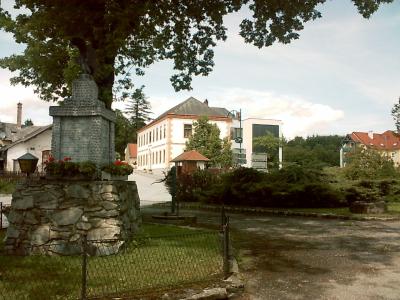
... link (0 Kommentare) ... comment
Wednesday, 25. January 2006
Our peacecamp-location.......
peacecamp, 11:58h
... link (0 Kommentare) ... comment
Wednesday, 25. January 2006
Nicht mehr Opfer und nicht mehr Täter sein
Jugendliche aus Israel, den Palästinensischen Gebieten, Österreich und Ungarn untersuchen Hindernisse auf dem Weg zu Verständnis und Koexistenz
Ein Hadassah Austria Projekt unterstützt von der Europoäischen Union, dem Bundesministerium für Bildung, Wissenschaft und Kunst und der Karl Kahane Stiftung
Idee und Konzept: Evelyn Böhmer-Laufer
peacecamp, 00:34h

Vom 15.-25. Juli 2006 wird in Franzen im Waldviertel ein peacecamp mit Jugendlichen aus Israel und den Palästinensischen Gebieten sowie aus Österreich und Ungarn stattfinden. Sie werden Gelegenheit bekommen, einander in ihren kulturellen, religiösen, nationalen Verschiedenheiten, aber auch ihren Ähnlichkeiten und Gemeinsamkeiten kennen zu lernen. Kreative und sportliche Spiele, gruppendynamische Übungen, vor allem aber zahlreiche Diskussionsrunden werden es ihnen ermöglichen, jenen Faktoren auf die Schliche zu kommen, die trotz des gewünschten Miteinanders feindseliges oder aggressives Gegeneinander entstehen lassen.
Psychoanalytische Großgruppen werden ein Reflektieren eigener Haltungen und Gefühle gegenüber Menschen der eigenen wie der "fremden" Gruppe ermöglichen: Man wird erleben können, dass uns nicht nur "noble", sondern auch von uns selbst verpönte Motive antreiben, dass unser Handeln nicht nur von den uns bekannten, bewussten Gefühlen, sondern auch - vielleicht sogar noch stärker - von unbewussten, und uns weniger lieben Motiven gesteuert ist.
Junge Menschen können oft direkter, in ihren Ausdrucksformen ungehemmter sein als Erwachsene; ihr Selbstbild hat sich noch nicht gefestigt, ihr Weltbild noch nicht geprägt; sie können emotionaler und unbefangener, fantasievoller, wagemutiger sein als Erwachsene. Ihre Persönlichkeitsentwicklung ist noch nicht abgeschlossen; sie sind noch formbar und empfänglich für neue Erfahrungen, die das bisher Gelebte, aber auch das von den Eltern Überlieferte zu relativieren und verändern vermögen. "Unbeschwert" oder "unbekümmert", wie wir sie, die eigene Jugend idealisierend, gern fantasieren, ist die heutige Jugend jedoch nicht, sondern geprägt von der Last politischer Katrastrophen, in denen die eigenen Eltern oder Großeltern Opfer oder Täter waren. Sie sind Kinder von Opfern, Kinder von Tätern, fühlen sich nun selbst als "Opfer" oder "Täter" - und den "Anderen", "Fremden", als Rächer, als Feind. So werden polarisierte Opfer- oder Täterbilder von einer Generation zur nächsten überliefert, starre Selbst- und Fremdbilder gefestigt und politische Veränderungen verhindert.
Wie wir damit umgehen und was mit uns passiert, wenn wir das "Fremde" in uns erkennen und zugeben müssen, dass es Teil von uns selbst und nicht (nur) Merkmal des "Anderen" ist, wird sich im Laufe des 11-tägigen Gruppenprozesses zeigen: Werden wir den "fremden" Teil von uns lieb gewinnen und in unser Selbstbild integrieren können, oder werden wir es "verstoßen", aus uns "aussiedeln" wollen? Wohin werden wir es verbannen, was wird aus ihm werden, aus ihm - dem weniger geliebten, weniger geschätzten Teil von uns selbst?
Diesen Fragen nachzugehen hat sich das für Sommer 2006 geplante peacecamp zur Aufgabe gemacht. Ob die teilnehmenden Jugendlichen durch diese Erfahrung an Reife gewinnen, ob sie konfliktfähiger, in ihrem politischen Denken differenzierter, toleranter, kreativer werden, und wie sich diese Arbeit auf das noch im Entstehen befindliche Selbst- und Fremdbild der Adoleszenten auswirkt, wird eine begleitende psychologische Studie zeigen.
Neben der Vorbereitung der Jugendlichen vor ihrer Zusammenkunft hier in Österreich sieht der Projektrahmen als Vorbereitung der erwachsenen TeilnehmerInnen eine analytische Selbsterfahrung vor, sowie eine Evaluation nach Ende des peacecamps.
Evelyn Böhmer-Laufer
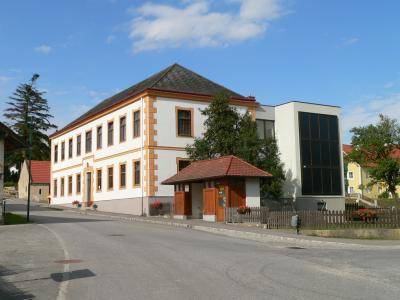
... link (0 Kommentare) ... comment
